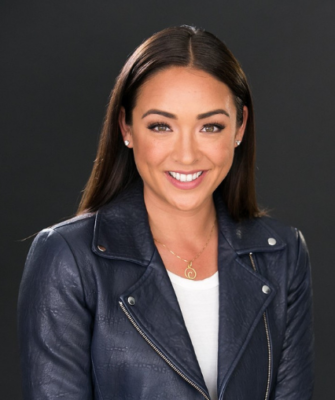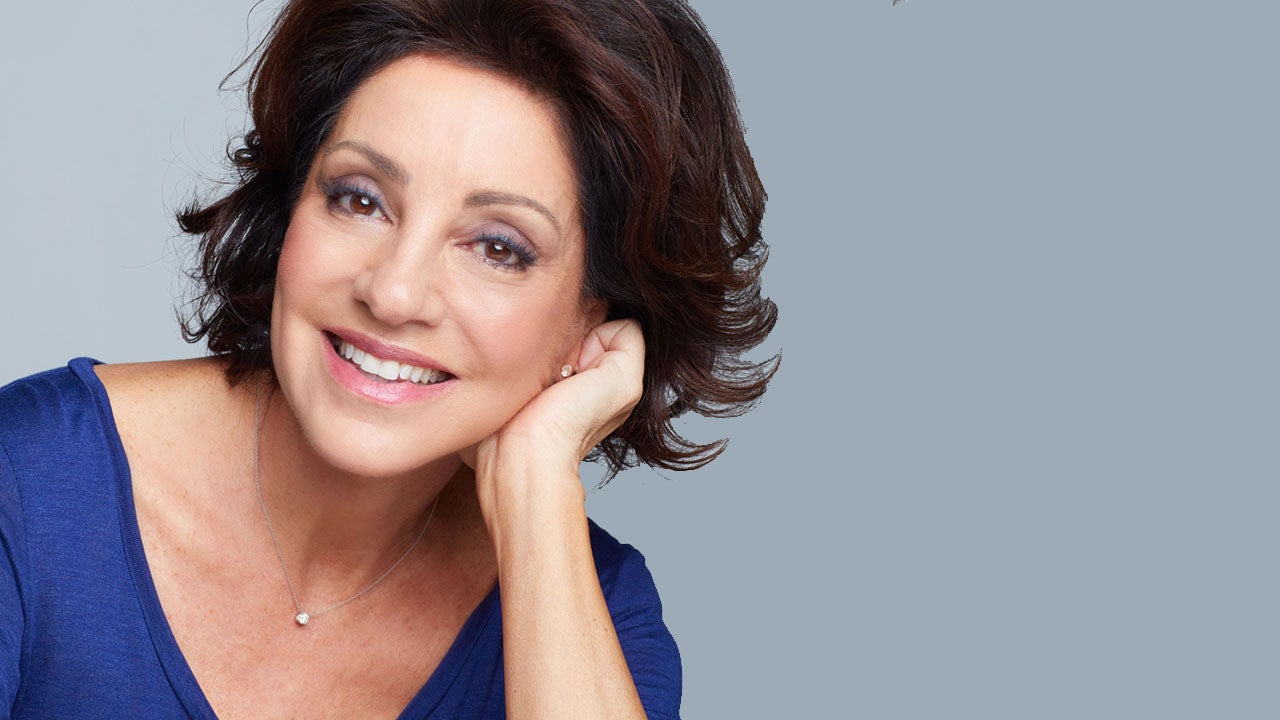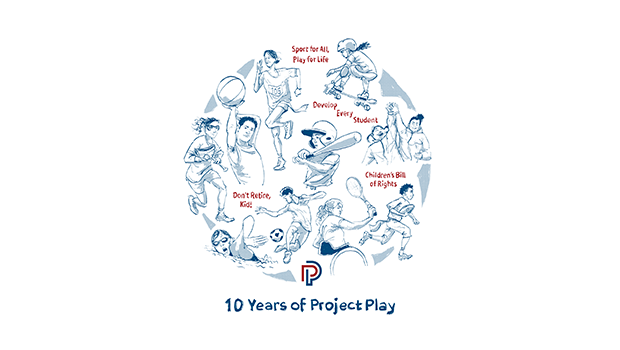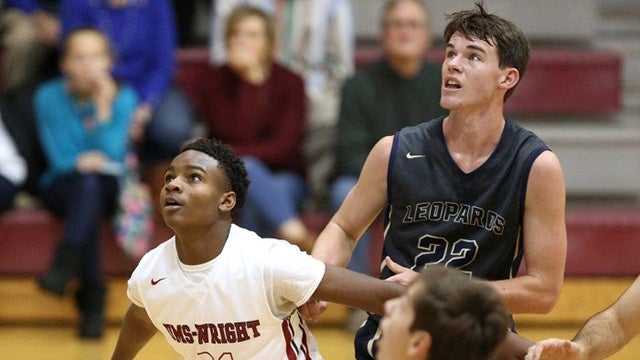 In August, the Aspen Institute Sports & Society Program launched a new campaign, “Don’t Retire, Kid,” to raise awareness about declining youth sports participation and solutions to create positive experiences for kids. One of the PSAs included Cassidy Hubbarth, a talented NBA and college football broadcaster at ESPN, as a reporter at a fictional press conference for a 9-year-old boy to retire from sports.
In August, the Aspen Institute Sports & Society Program launched a new campaign, “Don’t Retire, Kid,” to raise awareness about declining youth sports participation and solutions to create positive experiences for kids. One of the PSAs included Cassidy Hubbarth, a talented NBA and college football broadcaster at ESPN, as a reporter at a fictional press conference for a 9-year-old boy to retire from sports.
“What are you going to do with all your free time?” Hubbarth asked.
“Whatever’s fun,” the boy responded.
That’s as good a way as any to introduce Hubbarth to Project Play. On Sept. 17-18, Hubbarth will emcee the Project Play Summit. Jon Solomon, editorial director of the Sports & Society Program, recently spoke with Hubbarth about the pressures she faced to specialize in one sport, the pros and cons of social media use by young athletes, and the growing number of players who arrive to the NBA injured after playing too many games as a child.
Jon Solomon: What was that experience like for you at the Don’t Retire, Kid video shoot?
Cassidy Hubbarth: It was great. I was able to have a conversation with the young boy (Navonne Love), who was so impressive. It was pretty cool to see someone at his age perform the way he did. To be a part of this initiative means a lot to me because I was a three-sport athlete in high school. I took pride in the fact that I participated in a lot of sports. It’s my first introduction to this initiative, which I really didn’t know until that shoot day that kids were “retiring” and were no longer participating in sports. Given that I work in sports, sometimes it can be a little bubble and I don’t really understand what is happening outside that bubble.
Solomon: What sports did you play growing up?
Hubbarth: I played pretty much every sport except for hockey and, oddly enough, tennis because my whole family played tennis. I think because my parents and two older brothers played tennis, I never got in their doubles game. My main sports were basketball and soccer, and in high school I ran track. I also swam, played softball, and did gymnastics.
When I moved to high school, I was the only three-sport athlete in my grade, and I had a large graduating class of almost 700 people. A big problem was I was being pressured from my soccer team to drop basketball to specialize in soccer. I was better at soccer, but I was never going to drop basketball. I felt pride each season having a team to be part of. I think a lot of people who got the team awards on my soccer team played club sports, and it always felt a little political that I wasn’t on a club team and that’s who was voting on awards. It’s not like I’m holding a grudge all these years later! (laughs)
Solomon: Did you stick with basketball despite pressure from soccer?
Hubbarth: There was no way I was going to drop basketball. We won the state soccer championship my junior year. One of the best players on the team decided not to play her senior year to play travel (soccer) instead. And I just remember this letdown that we could have made another run for a title. But she had to do what was best for her and it opened up scholarship opportunities for her, so I can’t hold a grudge.
Solomon: You have a large social media presence. Social media has also become a big part of youth sports. What are the pros and cons of social media use by younger athletes?
Hubbarth: We’ve seen clips of LeBron James’ kid (playing basketball). That’s a lot of pressure in many ways to be the son of LeBron James. But there’s an interest. … Social media creates opportunities, but it creates pressure. Everyone likes a good story, but there’s no gate to close off the mean and cruel people in this world.
It’s hard, but I think young people are used to showcasing themselves in front of a camera. They’ve grown up with these devices, so I think it’s natural to them. I just worry about how it affects their psyche. I didn’t have a cell phone until I was late in high school, but I was taking video of myself. Facebook launched when I was in college. I made sure I stayed off Facebook because I knew I wanted to be in sports broadcasting, and I was worried people would post things of me I didn’t want out there. …
It’s very helpful there are NBA names like Kevin Love and DeMar DeRozan being upfront about mental health and anxiety, so there’s not this stigma around it. People are truly consumed through their phones and there is a little bit of social anxiety in interpersonal communication skills. Everybody is putting out their best foot forward on social media and then when it comes down it, there’s no hiding in front of cameras on the main stage. I can’t imagine what the pressure is to be Zion Williamson (who had more than 1 million Instagram followers as a high school basketball recruit) when I deal with my own anxieties just on television.
Solomon: There was a good two-part series recently by ESPN.com documenting that NBA players are arriving to the league with broken bodies because of how many games they’ve already played as youth. Do players talk about this wear and tear they accumulate before they even enter the league?
Hubbarth: Yeah, the AAU circuit is big business. Part of it is it’s what they love to do, and they’d probably be playing basketball somewhere at the park (if not for AAU). But it’s different when it’s a competitive stage like that because these AAU tournaments have gotten major. You can feel the tension at these tournaments because these players are fighting to be listed in the top recruits or be in front of college coaches. That plays into how hard they’re pushing it at these summer games.
Solomon: I saw that you have a new baby daughter. Congratulations. I know it’s incredibly early, but have you thought about what sports experiences you think you may want for her to have one day?
Hubbarth: I think she’s going to be an athlete. She’s pretty coordinated and close to walking and she’s not even nine months. As a parent, you judge every little thing day to day and you always think your child’s a genius! I want to support her on whatever she wants to do. I just hope she kind of explores as much as she can to be a part of a team. It’s something I really would like for her. Being part of a team taught me so many lessons that apply to my work today and my home life.
Register for the Project Play Summit on Sept. 17-18 in Detroit at as.pn/2019ppsummit. Speakers will include Chris Webber, Valorie Kondos Field, David Brooks and Tim Shriver. See the Summit agenda for more information. Learn more about Project Play at ProjectPlay.us.


